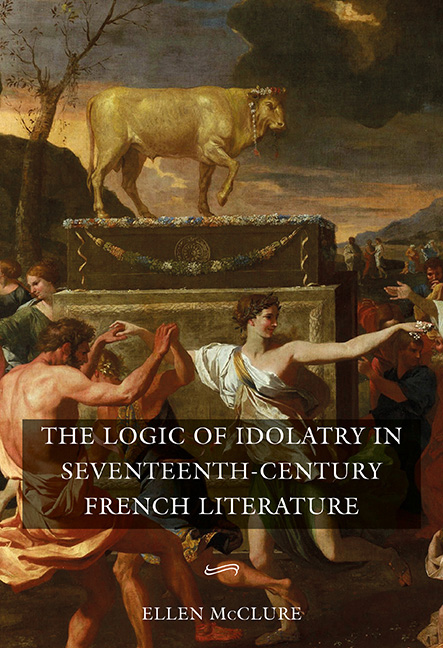Book contents
- Frontmatter
- Contents
- Notes on Translations
- Introduction: The Logic of Idolatry and the Question of Creation
- 1 Idolatry and Instability in Honoré d'Urfé's L'Astrée
- 2 Descartes’ Meditations as a Solution to Idolatry
- 3 Idolatry and the Questioning of Mastery in La Fontaine's Fables
- 4 Idolatry and the Love of the Creature in Sévigné's Letters
- 5 Theatrical Idolatry in Molière and Racine
- Conclusion: The End(s) of Idolatry
- Acknowledgments
- Bibliography
- Index
- Miscellaneous Endmatter
2 - Descartes’ Meditations as a Solution to Idolatry
Published online by Cambridge University Press: 28 April 2020
- Frontmatter
- Contents
- Notes on Translations
- Introduction: The Logic of Idolatry and the Question of Creation
- 1 Idolatry and Instability in Honoré d'Urfé's L'Astrée
- 2 Descartes’ Meditations as a Solution to Idolatry
- 3 Idolatry and the Questioning of Mastery in La Fontaine's Fables
- 4 Idolatry and the Love of the Creature in Sévigné's Letters
- 5 Theatrical Idolatry in Molière and Racine
- Conclusion: The End(s) of Idolatry
- Acknowledgments
- Bibliography
- Index
- Miscellaneous Endmatter
Summary
“Quant à ceux qui nient d’avoir en eux l’idée de Dieu, et qui au lieu d’elle forgent quelque idole, etc., ceux-là, dis-je, nient le nom et accordent la chose.” (As to those who deny having in themselves the idea of God, and who instead of it forge some kind of idol, etc., those people, I say, deny the name and accord the thing.)
Descartes and Idolatry: Problem Solved?
In the letter addressed to the theologians at the Sorbonne that accompanied the publication of the Latin edition of the Meditations on First Philosophy in 1641, Descartes congratulates himself for having reached certainty regarding the existence of God and the incorporeal nature of the soul not through the theological tools of faith or revelation, but through the philosophical power of the human mind. Although the letter concludes with a humble request for helpful suggestions and corrections, it is clear that what Descartes is really seeking is official approval. If the Sorbonne can certify that his conclusions, having reached the highest summit of clarity and evidence humanly possible, have attained the status of “exactes démonstrations,” Descartes declares, “je ne doute point … que, si cela se fait, toutes les erreurs et fausses opinions soient bientôt effacées de l’esprit des hommes” (I do not doubt that all the errors which have ever existed on these subjects would soon be eradicated from the minds of men). Atheists would shed their “esprit de contradiction,” and unbelievers throughout the world would be able to access the Christian religion through reason, rather than the circular logic of faith. What go unmentioned by Descartes are the confessional divisions that had been tearing Europe apart for a century, divisions of which he, schooled by Jesuits and resident of the Dutch Republic, would have been keenly aware.
In this chapter, I argue that, despite this silence, the polemics surrounding the issue of idolatry provide a powerful, yet neglected, subtext to Descartes’ insistence upon the immateriality of the human soul in the Meditations and throughout his responses to his contemporaries’ objections. D’Urfé's L’Astrée amply, and at great length, demonstrated the risks involved in attempting to access the divine through the seductive materiality of the world before going on to acknowledge the difficulties inherent in appreciating the world on its own terms once the existence of a benevolent, transcendent, omnipotent creator God has been posited.
- Type
- Chapter
- Information
- Publisher: Boydell & BrewerPrint publication year: 2020



